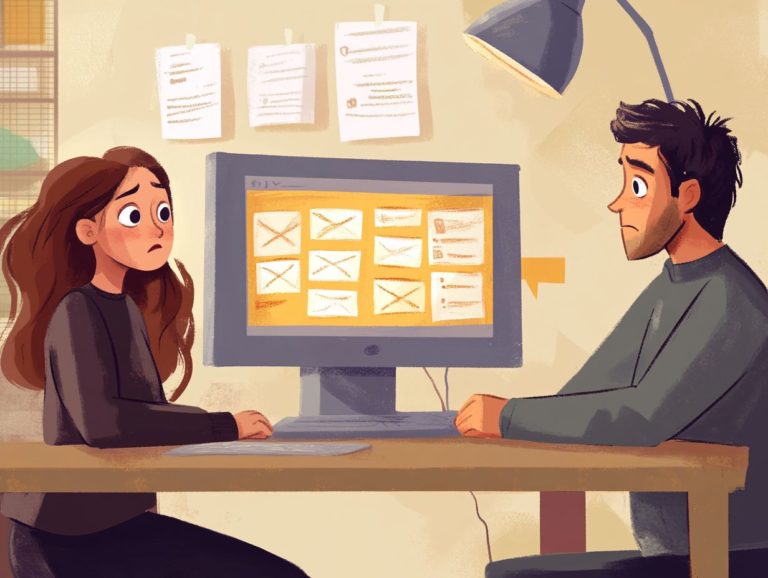How to Handle Internship Rejection Gracefully
Facing an internship rejection can feel disheartening, but it certainly doesn’t have to define your journey.
Understanding the reasons behind the rejection is the crucial first step in processing your emotions and developing effective coping strategies.
This article delves into the emotional impact of rejection, offering practical tips for transforming setbacks into valuable learning experiences. It also presents other opportunities that can help keep your career aspirations alive. Embrace this journey as a chance for growth and self-discovery!
Contents
- Key Takeaways:
- Understanding Internship Rejection
- Processing and Coping with Rejection
- Turning Rejection into a Learning Experience
- Handling Rejection with Grace
- Exploring Other Opportunities
- Frequently Asked Questions
- What are some tips for handling internship rejection gracefully?
- How can I use a rejection as a learning experience?
- What should I do if I receive multiple internship rejections?
- How can I use a rejection to network?
- Should I follow up after a rejection?
- Is it okay to ask for a second chance after a rejection?
Key Takeaways:

- Acknowledge and understand the reasons for rejection to avoid taking it personally.
- Utilize coping strategies to process the emotional impact of rejection and turn it into a learning experience for personal and professional growth.
- Handle rejection gracefully by maintaining professional etiquette and communication, while exploring alternative opportunities for personal and career development.
Understanding Internship Rejection
Understanding internship rejection is essential in your search process, as it can greatly affect your job search and professional relationships.
You might find yourself in the same boat as interns like Ana and John, facing rejection from companies like ABC Corp or the Asia Internship Program. This often occurs due to a range of factors, including personal circumstances and the benefits you miss out on when choosing one option over another.
By acknowledging the emotional implications of these rejections, you can navigate them more effectively. This helps uphold your professionalism in future communications.
Reasons for Rejection
Internship rejection can arise from a variety of factors, including a mismatch with the company’s culture or insufficient relevant skills.
For example, if you presented an unpolished professional image during interviews, your chances could take a significant hit. Likewise, lacking effective communication skills might lead to misunderstandings, leaving interviewers uncertain about your potential.
Obtaining constructive feedback after such experiences is crucial; it gives you the power to identify areas for growth, whether that means refining your resume or adjusting your communication style to better align with industry expectations.
By implementing these insights in future applications, you can markedly enhance your chances of securing a successful internship opportunity.
Processing and Coping with Rejection
Processing and coping with the emotional fallout of internship rejection is crucial for nurturing a positive outlook and fostering resilience. You might find yourself, much like Ana and John, wrestling with disappointment.
Embrace effective coping strategies to deal with your feelings and move forward in your search for internships. Prioritizing your mental well-being allows you to maintain professionalism while seeking new opportunities, ensuring that your confidence remains intact.
Emotional Impact and Coping Strategies

The emotional impact of internship rejection can be quite profound, often stirring up feelings of self-doubt and disappointment. However, effective coping strategies can help you navigate these emotions and foster resilience.
One powerful approach is journaling. By putting pen to paper, you allow yourself to process your feelings, reflect on the experience, and uncover valuable lessons learned.
Seeking guidance from mentors can also be incredibly beneficial; their insights and alternative perspectives can ease your transition toward future opportunities. Redirecting your focus toward personal and professional growth is key.
Setting new goals that align with your aspirations can reignite your motivation. Throughout this journey, remember to maintain professionalism in all your communications even after a rejection. This leaves a lasting positive impression and may open exciting doors for your future!
Stay hopeful and take the next step toward your dream internship!
Turning Rejection into a Learning Experience
Transforming rejection into a valuable learning experience means pinpointing areas where you can improve and leveraging feedback to elevate your future internship applications or interviews.
Reframe rejection as a stepping stone rather than a setback. This mindset can help you build better professional connections and cultivate resilience on your career development journey.
Identifying Areas for Improvement
Identifying areas for improvement after an internship rejection is crucial for your growth. It enables you to refine your skills and bolster your future applications.
In today s job market, honing your professional communication skills is essential, especially if you’re aiming for roles in fields like financial mathematics or renewable energy. Reflect on the feedback you received during the application process.
Recognize that constructive criticism can propel your development. Seek ways to enhance your analytical skills, teamwork, and technical proficiency to position yourself favorably for upcoming opportunities.
Emphasizing a positive attitude toward feedback allows you to adopt a growth mindset, ultimately enhancing your prospects for future success.
Handling Rejection with Grace
Handling rejection with grace is crucial for preserving positive relationships and upholding a professional image in the competitive world of internships. When you receive an internship rejection, take the time to express gratitude for the opportunity.
Crafting a thoughtful rejection email can cultivate goodwill and open doors for future networking connections. By approaching the situation with professionalism and respect, you leave a lasting, positive impression on potential employers.
Professional Etiquette and Communication

Professional etiquette and effective communication strategies are essential after receiving an internship rejection. They help you maintain professionalism and open doors for future networking opportunities.
Crafting a thoughtful rejection email demonstrates your maturity and respect for the employer s time. It s your chance to express gratitude and lays the groundwork for potential future interactions.
Ensure your correspondence is courteous and concise, reflecting genuine appreciation for the opportunity. Keeping communication lines open can be advantageous; a simple follow-up a few months later can reinforce your enthusiasm for future positions.
By approaching this experience positively, you can enhance your professional image and potentially transform a setback into a valuable networking opportunity.
Exploring Other Opportunities
Exploring new opportunities can be a thrilling next chapter after facing internship rejection. It enables you to diversify your search and align your efforts with your career aspirations.
By actively seeking alternative paths and networking opportunities, you can build meaningful connections and gain valuable experience. This proactive approach enhances your resilience and significantly contributes to your professional growth.
Alternative Paths and Opportunities
Alternative paths and opportunities in your internship search can unlock unique experiences that align with your career goals.
Exploring diverse fields like marketing firms, trading companies, or the renewable energy sector can enhance your skill set and broaden your professional horizons. These sectors often offer valuable internships with rich practical experiences.
While gaining insights into specific industries, consider the crucial role of networking opportunities. These connections can unveil hidden internship openings that fly under the radar.
Engaging with professionals in these fields can significantly enhance your career prospects, leading to rewarding job placements down the line.
Frequently Asked Questions
What strategies have worked for you? Share in the comments!
What are some tips for handling internship rejection gracefully?

1. Acknowledge your feelings: It’s natural to feel disappointed or upset after receiving an internship rejection. Take some time to process your emotions before moving on.
2. Ask for feedback: Reach out to the company or the hiring manager and ask why you were not selected. This feedback can help you improve your future applications.
3. Respond politely: Responding gracefully is important, even if you’re disappointed. Thank the company for their time, and express your continued interest in future opportunities.
4. Keep a positive attitude: One rejection shouldn’t discourage you. Stay positive and keep applying to other internships!
How can I use a rejection as a learning experience?
1. Reflect on your application: Review your application materials and identify any areas for improvement.
2. Update your resume and cover letter: Use the feedback you received to enhance your resume and cover letter, helping you stand out in future applications.
3. Practice your interview skills: If you had an interview, think about how you can improve your performance for future opportunities.
What should I do if I receive multiple internship rejections?
1. Don’t take it personally: Remember, rejections are a normal part of the job search process. Stay confident!
2. Keep applying: Maintain a positive attitude and continue applying to other internships. The more you apply, the better your chances!
3. Expand your search: Look for internships in different industries or locations to widen your opportunities.
How can I use a rejection to network?
1. Stay in touch with the company: Staying connected can be beneficial. Future opportunities may arise, even if you weren’t selected this time.
2. Ask for referrals: If you built a good connection, ask the hiring manager or employees for referrals or introductions to other companies.
3. Attend networking events: Use this rejection as motivation to attend events and make new connections. You never know what opportunities may come from it!
Should I follow up after a rejection?
1. It depends: If the company asks you not to follow up, respect their wishes. If not, feel free to reach out and thank them again for their time.
2. Keep it brief: If you do follow up, keep your message short and polite. Thank them again and express interest in future opportunities.
Is it okay to ask for a second chance after a rejection?
1. It depends: If you have significantly improved your skills or qualifications, consider reaching out to express your interest in a second chance.
2. Be honest: If you ask for a second chance, explain why you’d be a better fit now. However, be prepared for a no, and accept their decision gracefully.






